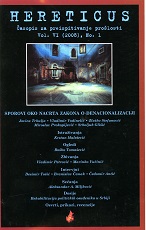Denacionalizacija: veliko iščekivanje izvesnog
Restitution of Property - Great Expectations of Certainty
Author(s): Vladimir V. VodinelićSubject(s): Law, Constitution, Jurisprudence
Published by: Centar za unapređivanje pravnih studija
Keywords: right to property restitution; obligation of restitution; Serbian draft act from 2007; violation of the Constitution and the European Convention for the Protection of Human Rights and Fundamental Freedoms
Summary/Abstract: A state is not obliged to undertake restitution. Nor were the victims of confiscation of property due to ideological reasons entitled to a restitution of property right. However, the state obliged itself to restitution, most lately with the Act on Recording and Reporting of Confiscated Property from 2005. This Act regulates more than could be concluded from its title; it created a firm legal expectation of restitution which went beyond the point of no return and at the same time determined the restitution method - the restitution of confiscated property and compensation for confiscated property (I). This restitution method was applied by the Act on Restitution of Property to Churches and Religious Communities from 2006. Neither the latter statute nor the draft General Restitution of Property Act (November 2007) use the possibility, created with the annulment of the of state property monopoly at vacant land for building purposes, to restore a principle of "superficies solo cedit". Moreover, the draft does not follow how the Act on Restitution of Property to Churches and Religious Communities elaborated the denationalisation method by undertaking restitution and compensation. Instead, it discriminates against all other beneficiaries of restitution since they would not receive compensation when a church would get it; since they would be compensated for a smaller amount and under the less favourable terms than those that apply to the church; finally since they would be compensated within the limits of previously defined funds, while no such restriction applies to the church. As long as there is a different regime for the church, discrimination of others will be contrary to the prohibition of discrimination, since there is no justification for this in any objective and reasonable sense and moreover it is disproportionate (II). However, it is not only that in this manner the draft is contrary to the Constitution and the European Convention on Human Rights and Fundamental Freedoms. It is in violation of these acts by annulling, without necessary and justified reason (general interest) and without any compensation, right of lease and easements; in this manner it violates guaranteed right to peaceful enjoyment of possession (IV). The Constitution is additionally violated by prohibited retroactive annulment of legal transactions concerning the disposal of nationalised property; moreover, it violated by prescribing retroactive responsibility for damages on the basis of distinctive presumption of innocence (III). If all these provision become law in force the Restitution of Property Act represents an illegal means for achieving a legitimate objective. In relation to this, other weaknesses are less serious: missing and inappropriate provisions (V). In its current form the draft act cannot put an end to great expectation of legal and certain restitution of property (VI).
Journal: HERETICUS - Časopis za preispitivanje prošlosti
- Issue Year: 2008
- Issue No: 1
- Page Range: 16-46
- Page Count: 31
- Language: Serbian

